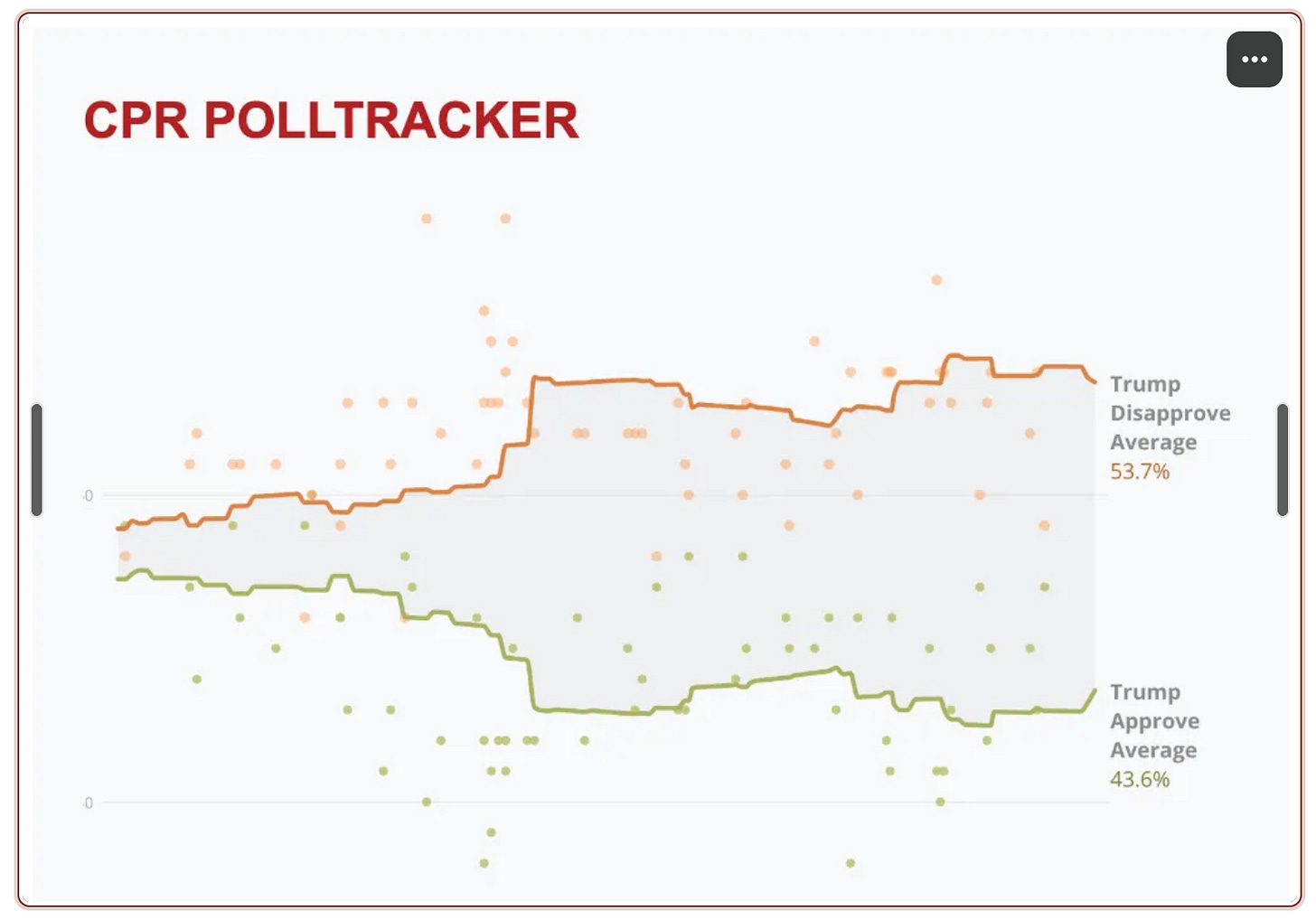1. One of the stranger things about national politics at the moment is what political “strategists” call “the narrative”. For months now, it’s gone like this: Trump bestrides the political landscape, master of all he surveys. Institutions bow before him, throwing money at his feet presidential library. Never in the post-Vietnam era has a president wielded so much power, with such success, in so few months. You’ve read or heard the rest. It’s on a seemingly endless loop.
And it’s certainly at least partially true. Trump has overwhelmed his political opposition (such as it is). Democrats are in disarray (understatement of the year). Trump has cowed the owners of major news organizations. He’s cornered some of the nation’s leading academic institutions. He’s jammed some of the nation’s leading law firms into “settlements”, all in Trump’s favor. He’s effectively ended DEI programs at major financial and business corporations. The Supreme Court has granted him remarkable latitude. And so on.
What Trump has not done is convince the electorate that what he’s doing is improving things in The United States of America. Take a look at the data.
1. The mood of the nation, as measured by the University of Michigan’s consumer-sentiment index is near (statistically at) an all-time low:
2. The mood of the nation, as tracked by the right direction/wrong track measure, is near Biden-level gloom.
(Source: apnorc.org)
3. President Trump’s approval ratings, overall and on specific issues, are uniformly negative:
(Source: apnorc.org)
4. His job performance disapproval rating has been consistently high:
(Source: apnorc.org)
5. The Cook Political Report’s “Polltracker” is a bit more upbeat on Trump, but still decidedly negative (44%-54%):
6: His personal favorability rating has reverted to the mean:
(Source: economist.com)
7. The One Big Beautiful Bill isn’t selling:
8. He’s seriously underwater on healthcare issues. From The Economist/YouGov tracking poll (Reading left to right: Column #1: the approval/disapproval differential. Column #2: strongly approve. Column #3: somewhat approve. Column #4: somewhat disapprove. Column #5: strongly disapprove. Column #6: no opinion.):
9. How might all this manifest itself in the mid-term elections in November of 2026? The correct answer is “we have no idea.” But at the moment, the numbers aren’t promising for Republicans in competitive races:
A new Fabrizio Ward (R) poll shows Republicans trailing on the generic ballot in 28 House battleground seats, including 15 where they won by five points or less in 2024.
“Among those most motivated to vote, an early indication of vote likelihood in the midterms, the Republican is down 7 points.” (Sources: politicalwire.com, politico.com. Mr. Fabrizio is one of the president’s pollsters.)
The vast majority of Republican elected officials in the House and Senate (and in governorships across the country), appear unfazed by all of the above. Three reasons for that:
Most Republican elected officials are elected from Red states, so Trump’s national unpopularity and the national unpopularity of (most of) his agenda is not a problem for them, the way it is for Republican elected officials in “swing states.”
Most (all?) Republican elected officials are scared to death that President Trump will find them a primary opponent and thus cost them their jobs. Medicaid might be a loser issue, but political survival comes first.
Most Republican elected officials fear MAGA’s wrath. Cross the movement and the movement will come looking for you, personally and sometimes with menacing malice. If you doubt this, ask former Wisconsin Congressman Mike Gallagher (R), who not so long ago would have been seen as a rising GOP star.
Republicans in swing states are, of course, privately panicked about what this might mean for them, and for good reason. Assuming the Democrats don’t nominate a slate of Zorhan Mamdanis for statewide and federal offices in swing states, the GOP incumbents will be running against what is now a riptide; one that may get stronger as the calendar turns over.
Swing state Republicans can console themselves by reminding one another that Democrats are the party of “own goals” and can snatch defeat from the jaws of victory effortlessly.











